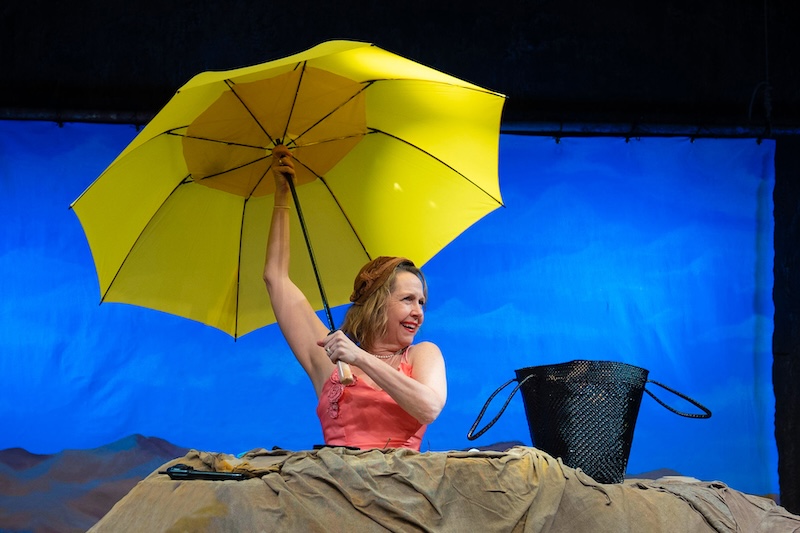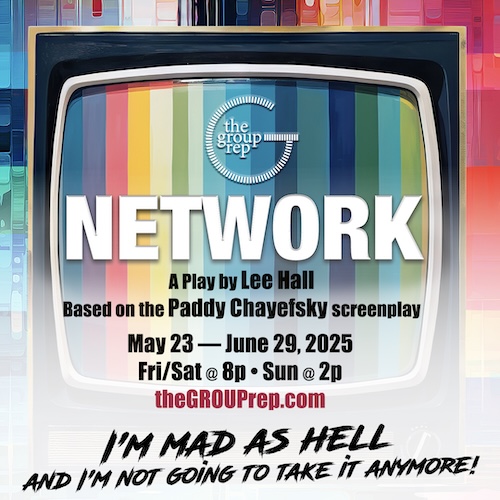
Monica Horan (Photo by Grettel Cortes)
Reviewed by Steven Leigh Morris
Independent Shakespeare Company
Through June 7
RECOMMENDED
“What were those unforgettable lines?”
So ponders Winnie (Monica Horan) in Samuel Beckett’s mid-20th-century tour-de-force monologue. It’s a winking joke by Beckett, though it’s not clear that Winnie is in on it. Her husband Willie (Timothy Durkin), literally crawling around a mound of dirt, puts in a couple of brief appearances. In Act One, Winnie is buried to her breasts in that mound, with access to a bag containing a toothbrush and pistol (should she wish to do something about her plight), and a parasol for shade. She’s in a kind of desert. And yes, things will only get worse.
Willie comforts her by occasionally responding with a grunt or hand signal to her prattling about the wonders of daily ritual, of brushing teeth, of clipping nails — activities that give life meaning, if meaning is to be found in any of this. When not crawling on hands and knees with pained exertions, Willie “lives” lodged now in his “hole” — a grave waiting for him to die, though actually the grave couldn’t care less. Meanwhile, Winnie expresses disgust at the pornography he enjoys (an image on a kind of postcard; “filth” she calls it), and at his penchant for eating his own snot from the handkerchief with which he just blew his nose, before placing that handkerchief on his wounded head, as a kind of sunscreen.
“I worship you, Winnie, be mine,” she recalls as his marriage proposal how many years ago? That was pretty much the last she heard from him.
Winnie’s spirited, crumbling optimism is a testament, but to what? Aging? The onset of dementia? The futility of action? Life’s end? World’s end? All the above? This is the view of a language-obsessed Irish poet who writes about his characters’ sentimental yearnings but whose writing is, itself, bereft of sentimentality. Rather it is a grimly comical, brutal and austere reckoning of what time does to all of us, and of our Quixotic efforts to rescue ourselves from its ravages. Beckett’s frame is cosmic.
This frame offers the antithesis to plays advocating for social justice and action to improve our lives. In Happy Days, along with Krapp’s Last Tape and Waiting for Godot, Beckett makes a mockery of such a view. Nothing we do will make any difference. The moral arc of the universe does not bend towards justice in these plays. It bends towards oblivion.
Horan offers an animated Winnie, with an elastic face that swiftly morphs from grinning to anguish, though the grinning is a form of anguish. Her approach to the role is that of a clown, putting on a brave, chirpy face while, on rare occasion, exposing flashes of despondency after realizing the trap she finds herself in. It’s a beautifully modulated performance, under Melissa Chalsma’s direction, that aims not to belabor Beckett’s strategic repetitions, but to pace them out. She recites one section at a breakneck pace, recalling Monty Python sketches where a deranged character rattles out belligerent nonsense while the others in the room stare dumbfounded.
Durkin’s Willy is similarly well cast. When he finally emerges from his hole so that we can see him in his entirety (now dressed in a top hat and tuxedo, “in the old style” as Winnie repeats throughout the play; Stephanie Shaw did the costumes), he strikes such an odd and perfect shape, part human, part slug. Near play’s start, at his first appearance, his shaved scalp reveals a fresh scar down the middle, as though he’s either been struck by an axe, or recently had a lobotomy. Either interpretation is valid for the circumstances, but the sight elicited gasps from the audience at the performance I attended.
In Paige Hathaway’s emblematic set, the mound is comprised of burlap-like blankets in hues of orange and gold and rust. The backdrop is a suspended and elongated canvas with a Mediterranean desert scape painted onto it — hills and low-lying brush with whisps of white clouds against a piercing blue sky. It evokes a Southern California summer in the approach to the low desert, with its relentless heat and unyielding, eye-squinting glare, thanks also to Bosco Flanagan’s lighting.
For all this, and for the enthusiasm this production generated among its opening night audience in Atwater Village, Beckett serves up a conundrum for artists who wish to use their art to inspire meaningful action; Beckett presupposes that there is no meaning, let alone meaningful action. He has been denigrated as a cynic; worse, a reactionary. Perhaps. He’s just a poet, along with others of his generation, T.S. Eliot and W.B. Yeats, who looked aghast at their generation’s capacity for destruction, and self-destruction in the wake of two world wars, and the pointless cruelty and carnage they inflicted.
The world in the next century, our century, looks not so different, in places such as Gaza, and Ukraine, and here at home, as we turn on each other, against each other, for no good reason, largely based on truths we can’t agree on. This is part of the entropy Beckett describes. Call it active entropy, the recycling of tropes, which is mostly what Winnie does in this play, has been doing throughout her life and will continue to do until that loud bell rings, that school bell, that prison bell, announcing that’s it’s night.
Independent Shakespeare Co., 3191 Casitas Ave., Atwater; Thurs.-Sat., 7:30 pm, Sun., 2 pm; thru June 8. https://iscla.my.salesforce-sites.com/ticket/#/events/a0S5c00000Dic0CEA Running time, 105 minutes, including one intermission











